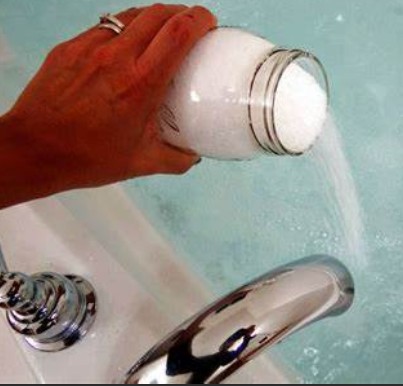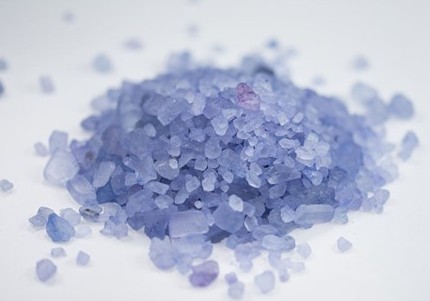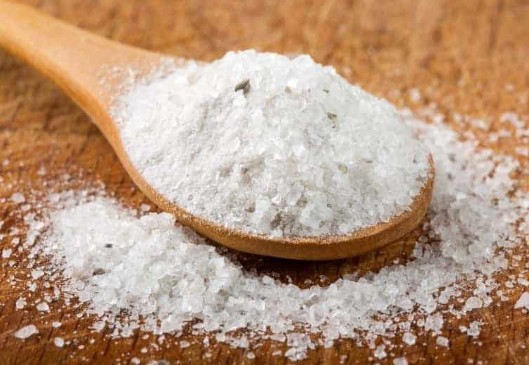Can You Use Epsom Salt In A Jetted Tub? (And How To Use it Effectively!)
Epsom salt, commonly known as magnesium sulfate, is a complex mixture of oxygen, magnesium, and sulfate. It is said to soothe muscular aches and stiffness, decrease inflammation, and helps ease stiff joints when employed as a bath salt, which begs the question, can you use Epsom salt in a jetted tub?
You can use pure Epsom salt in plain water jetted tubs or jacuzzi tubs. Warm water easily dissolves Epsom salt, and there is little risk of clogging if you use one that does not include essential oils. The Epsom salts should be free of carrier oils, and the water should not contain any chemicals.
Always make sure you check the manufacturer’s suggested guidelines before adding Epsom salt to a jetted tub. If you’re interested in learning more about Epsom salt use in jetted tubs, you can find out more in this post.

Can you use Epsom salt in a jetted tub?
Epsom salts reportedly help create a soothing experience. In the tub, epsom salts could improve relaxation compared to a normal shower or even a bubble bath.
And while there isn’t a lot of evidence of real health benefits, anecdotal research suggests they can assist with the following conditions: bruises, arthritis, sunburn, psoriasis, stiff joints, insomnia, stress, and many more.
But can Epsom salt damage bathtub mechanisms, or is it safe to use in a jetted tub?
You can safely use a moderate amount of Epsom salts in pure water jetted bathtubs. If used appropriately and flushed regularly, it should not harm the mechanism of the bathtub, your plumbing, or the pipes.
With that being said, you should keep in mind that you shouldn’t add too many Epsom salts to your jet tub. If you use these salts every time you wash without cleaning the unit, it may leave sediments inside the jet system that could harden and cause damage to the jets or the tub itself.
However, the chemical dissolves easily in pure water and should not impede the functionality of the system. But don’t forget that many Epsom salts contain scents and oils as well that might harm your bathroom plumbing if used in excess.
If you have a hot tub with chlorinated water, putting Epsom salt in it might throw off the pH levels of the water and cause burns on the skin. This is because the acidity of the Epsom salts, reacting with the chlorine and the temperature of the water, can become dangerous to exposed skin. So, don’t use this mixture of magnesium, sulfate, and oxygen in your hot tub.
What Are The Benefits Of Using Epson Salts In A Jetted Tub?
Epsom salts reportedly come with the following benefits:
- Using plain Epsom salts without any additional oil or perfumes in a pure jetted bathtub enhances the soothing effect of the water massage. You can achieve this by including medicinal properties.
- Epsom salt is a mineral required by multiple body fluids. It assists in the elimination of contaminants by supporting the body’s enzymatic activities.
- It also helps your body manufacture more serotonin, a mood-enhancing chemical and relieves congestion from the lymph nodes.
Many of these claims are merely anecdotal, and don’t come with a lot of scientific backing.
How to use Epsom salts in a jetted tub?
Here’s how to bathe in a therapeutic Epsom salt jetted tub without jeopardizing your health:
- Half-fill your jetted tub with hot or warm water and add two cups of Epsom salt to the area closest to the hot water inlet.
- If your jetted tub is bigger, use four cups. Since this is the hottest part of the jet tub, the Epsom salt will break down better.
- Turn off the jets for the time being and allow enough time for the magnesium sulfate to dissolve in the hot running water. If there are no more salt granules at the bottom of the bathtub, it means the salt has dissolved completely.
- Switch on the tub jets and swirl the water more to disintegrate any lingering Epsom particles.
- Relax in the jetted tub for 20–30 minutes, permitting the Epsom salt to work its charm on your skin and muscles, and then wash off any salt particles.
- Shut off the jets and leave the jetted tub.
- Wrap a robe or towel over your body to ensure that your warmed muscles remain warm.
- Bathe with warm water for 5-10 minutes to remove any Epsom salt accumulation.
- Since Epsom salt can dry your skin, apply a moisturizing moisturizer to prevent dry skin.
Be sure to rinse your jetted tub after such an Epsom salt bath to eliminate mineral deposits that could ruin the tub’s walls. Epsom salt accumulation can damage the jets’ and drain area’s systems.
How to clean a jetted tub after an Epsom salt bath
Cleaning a jetted tub after having an Epsom salt soak is critical to avoid the collection of mineral deposits that might eat away the tub’s walls. Epsom salt accumulation can also wear down the jets.
While you could technically leave the hot water in the jetted bathtub for a few days, doing so raises the chance of tub damage. You can follow the procedure below to clean your jetted tub after an Epsom salt bath:
- Drain the bathtub altogether.
- Rinse the tub’s walls with a plastic jug, taking note of the region surrounding the jets.
- Spray the water intake, the jets, and drain sections with a mixture of pure filtered water and a few droplets of dish soap using a plastic spray bottle with a powerful stream of water.
- After each 8–9 Epsom salt washes, take a conventional bath with only typical tap water, leaving this water to boost to clean the jet motors and other tub fittings.

Safety tips for using bath salts in a jetted tub
Here are a couple of safety tips for you to consider when using bath salts in a jetted tub. Make sure to read these carefully so you don’t put yourself or your tub at risk.
- Read the manufacturer’s instructions to determine if bath salts are safe to use.
- When looking for bath salts, choose pure ones over sensual ones with aromatic oils.
- Before adding the bath salt, make sure your water is warm enough to allow it to dissolve fully.
- Clean the tub, pump, and jets regularly to avoid residue accumulation.
- When utilizing jetted tubs having chemical-infused water, refrain from using plain Epsom salt; instead, use tub-specific Epsom salt.
Can you use Epsom salts in chlorinated water?
Many caution against combining chemicals with additives such as Epsom salts in water. This is because the salts could alter the chemical properties of the water, causing a burning sensation on your skin. Additionally, many people may be wondering, can you use essential oils in a jetted tub? These may lead to a build-up of residue in the jets, leading to blockage.
Salts might cause harm to the plumbing system. You can use jetted bath Epsom salts because they don’t have carrier oils which are hazardous to your jets, not to mention their inability to compromise the chemical composition of water.
Can you use Epsom salts in plain water?
So, can you use bath salts in a jetted tub?
Epsom salts can be used comfortably in a jetted bathtub filled with pure water. If you use the bathtub properly and flush the plumbing regularly, it should not damage the tub’s mechanism.
However, using the salts frequently without cleaning your jet tub will leave residues in your tub, which could be a problem when they harden. In contrast, Epsom salts dissolve readily in normal water and should not block the system’s operation.
Do Epsom salts expire?
Epsom salt is an organic substance with no expiration date. An old package of Epsom salts could become hard or clumpy over time.
Therefore, the substance is still good to use in its natural state without any additional oils or fragrances.
However, if additional components have been combined with Epsom salts to make a bath salt mixture, it will most certainly expire. Check the expiry date on store-bought items because households often use homemade items within a few months.

Summary of using Epsom salt in a jetted tub
Epsom salt proponents claim this compound helps with muscular discomfort, inflammation, and flushing toxins from your body. Epsom salt, when paired with the therapeutic characteristics of a jet tub, could be a treatment for a hurting or stressed body.
Although you can use Epsom salt in the jet bathtub, you must take steps to prevent salt residue from hardening within your jet system.
Also Read:
Let Us Know How We’re Doing!
Did this expertly prepared resource answer your question?
Do you have another question about home maintenance, home improvement projects, home appliance repair, or something else?
Get more information, send in questions and keep the discussion going by contacting the I’ll Just Fix It Myself company customer service team at at 1-800-928-1490 or Email us at [email protected]
